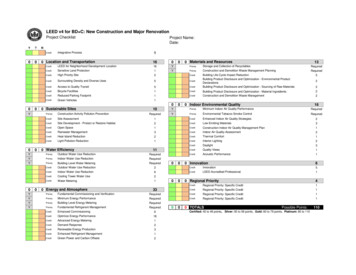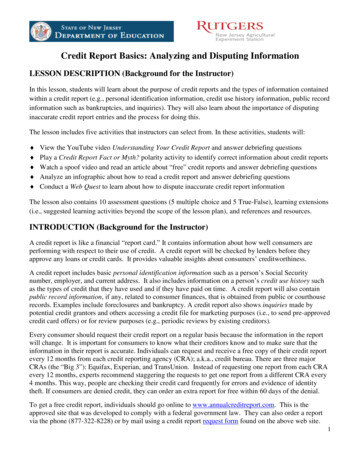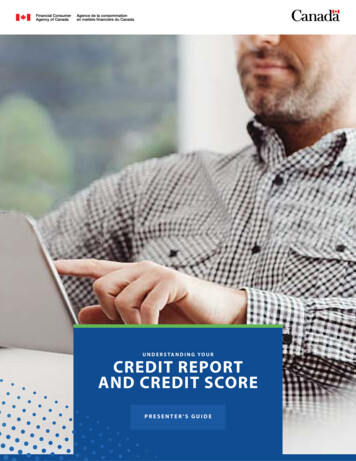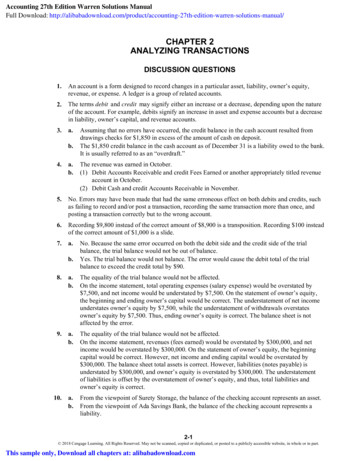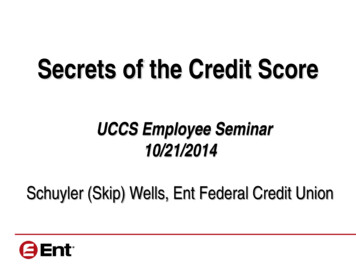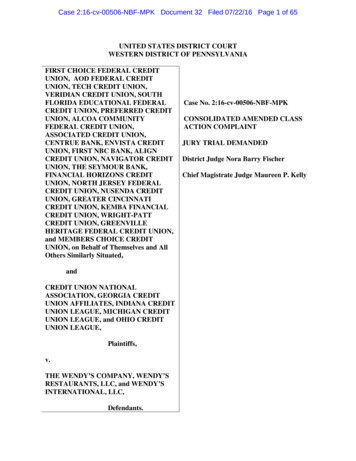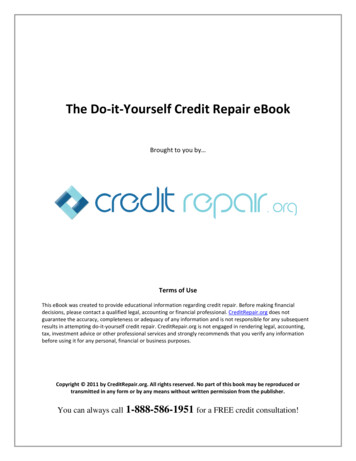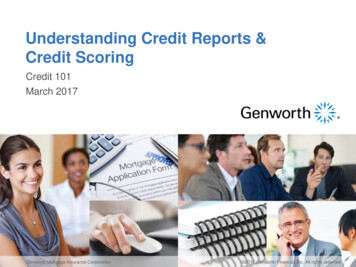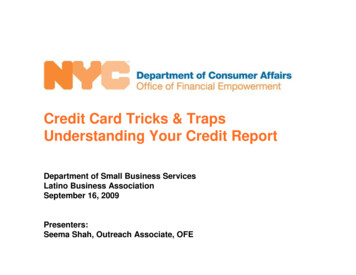
Transcription
Credit Card Tricks & TrapsUnderstanding Your Credit ReportDepartment of Small Business ServicesLatino Business AssociationSeptember 16, 2009Presenters:Seema Shah, Outreach Associate, OFE1
Mission of DCATo ensure that consumers and businesses benefit from a fair andvibrant marketplace.Strategic Priorities Empowering and protecting consumers. Facilitating fair business practices. Conducting efficient, accountable, and customer-friendly operations.Overview of OFEFounded by Mayor Bloomberg in December 2006 as the first localgovernment initiative in the nation focused exclusively on antipoverty and financial empowerment efforts for those with lowerincomes.2
Consumer Protection Law The New York City Consumer Protection Law was enacted by the CityCouncil in 1969. The law authorizes DCA to adopt rules and regulations that protect thepublic from all “deceptive or unconscionable trade practices in the sale,lease, rental or loan of any consumer goods and services, or in thecollection of consumer debts.” The Department's CPL authority broadly covers marketing s & ReceiptsPackaging & StandardsPricing, Sales, and Refund PoliciesPromised ServicesSpecial Offers, Sales and Promotions3
Today’s Goals Understand what credit is and why it is so important Become familiar with a credit report Learn how to establish, build, and maintain a good credit history Learn the common tricks that make it essential to read the fine print4
What is Credit? Money borrowed to pay for things, usually referred to as a loan Creditors check credit history to determine individual trustworthinessin paying back debt Credit can cost more in the long run—understand interest ratesand fees5
Potential Lenders and Creditors Look For: Character – Does the borrower appear fiscally responsible?– A good credit report and score– A good past history of paying on time– A set of good financial and personal references Capacity – Does the borrower have the ability to repay the loan?– Is the applicant employed?– Are there other sources of income?– What are the applicant’s expenses (is there net income after expenses –cash flow)? Capital– Does the applicant have any savings, or investments?– Does the applicant have any collateral such as real estate?6
Check Your Credit Report! A credit report is a record of how you have paid past debts It lists what credit you have and if you have been payingon time Checking your credit report for errors can help prevent identitytheft You are entitled to one free credit report each year from eachof the three credit bureaus: TransUnionExperianEquifaxVisit annualcreditreport.com for your free report7
Do You Know Your Credit Score? A credit score is a number assigned by credit reportingcompanies based on information in your credit report The higher your credit score—the better your credit history How does Credit / Credit Score affect our lives? Apartments Jobs Loans and credit cards: Rates and fees You can purchase your credit score through annualcreditreport.com8
Calculating Your Credit Score 35%– Punctuality of payment in the past 30%– The amount of debt, expressed as the ratio of current revolvingdebt (credit card balances, etc.) to total available revolving credit(credit limits) 15%– Length of credit history 10%– Types of credit used (installment, revolving, real estate) 10%– Recent search for credit and/or amount of credit obtained recently9
Credit Reports and ScoresEstablishMaintainImprove/RepairCreating a link to thefinancial systemPay bills on timeStart paying bills ontimeTake out a securedloan or credit cardTry not to carry abalance on your creditcardsCreate a payment planto keep you on trackwith your paymentsOpen a credit card(be responsible)Avoid credit cards withhigh interest ratesAddress bad debtissues-negotiate withcollectors (we can help)Pay bills on timeCorrect errors on yourcredit report10
John Doe’s Credit Score - Before11
John Doe’s Credit Report - Before12
John Doe’s Credit Report - After13
John Doe’s Credit Score - After14
Negative Records on Credit ReportsLength of Time on Reports Negative information: Reported for 7 years Bankruptcies: Reported for 10 years Criminal records: No Time Limit15
Choosing a Credit CardQuestions to Ask When Choosing a Credit Card What is the Annual Fee? What is the Annual Percentage Rate? How is the Interest computed? Is there a grace period before I have to pay interest? How long is it? How is the Billing Period defined? What is the finance charge? What is the credit limit? How much is the late fee? Is there a balance transfer feature? How much does it cost? What incentives such as points, cash back or other additionalvalue can I get?16
Credit Card Tricks & TrapsCredit Cards can have hidden fees and conditions.A few tricks to keep in mind when reading the fine print: Rising Interest Rates – “Universal Default” Clause Low Introductory Rates – 0% APR Offers Penalty Interest Rates and Late Fees Expensive Cash Advance Loans Floating Due Dates and Double Cycle Billing17
Free One-on-One Counseling!Financial Empowerment Centers Launched by Mayor Bloomberg as part of hisFive Borough Economic Opportunity Plan to helpNew Yorkers through the economic downturnLed in partnership with the DCA Office of FinancialEmpowerment (OFE) and community-based partnersin Manhattan, Queens, Brooklyn and the Bronx to providecounseling in English and Spanish in person or by phoneCall 311 to set up a free tGovernment Benefits18
Financial Empowerment Centers Can Help! You are having trouble managing your budget. You need a plan to pay down debt. You are getting calls or letters from a debt collector and don’t knowhow to respond. You are contemplating a debt consolidation loan or debt settlement butare unsure if this is the right step. You are stuck in an agreement with a credit repair agency and don’tknow how to get out. You want to find the government benefits for which you are eligible. Your identity has been stolen or you have been the victim of a financialscam. You need help opening a bank account or finding ways to save moremoney.19
How Counselors Can Help Counselors will work with you to review your full financial pictureand identify your needs. Together you will create a plan to strengthen your financial health. Counselors will help you implement the plan and negotiate withcreditors, create a budget, find affordable financial products andservices, screen for government benefits, and find referrals.20
Financial Empowerment CentersThe BronxBrooklynOperated by Phipps CDCPhipps Opportunity Center, MelroseOperated by Bedford-StuyvesantRestoration CorporationRestoration Plaza, Bedford-Stuyvesant*Mobile Locations* Groundwork, Brownsville Community Justice Ctr, Red Hook*Mobile Locations* Workforce1, Huntspoint Catholic Charities, Parkchester Phipps Center, West FarmsManhattanQueensOperated by Credit Where Credit is DueNorthern Manhattan ImprovementCorporation, Washington HeightsOperated by The Financial ClinicCatholic Charities/HomeBase, Jamaica*Mobile Locations* One Stop Career Center, Harlem Midtown Community Court, Midtown LESPFCU, Lower East Side*Mobile Locations* Workforce1, Jamaica LaGuardia College, Long Island City Partnership for the Homeless, East NY21
42 Broadway, New York, NY 10004nyc.gov/ofe22
Presentations on the WebInstructions for Downloading Today’s PresentationsTo obtain a copy of this presentation or any other materials used aspart of the Seminar for Latino Business Associations, please visit theevent website at:www.nyc.gov/latinobusiness23
A credit report is a record of how you have paid past debts It lists what credit you have and if you have been paying on time Checking your credit report for errors can help prevent identity theft You are entitled to one free credit report each year from each of the three credit bureaus: TransUnion Experian Equifax
